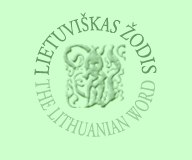AUŠRINĖ (Morning Star),
Lithuanian youth magazine, published with several interruptions from
1910-1933. The magazine was first published in Vilnius on Jan. 30,
1910 as an independant supplement to the daily Lietuvos Žinios
(Lithuanian News). From 1910-1913 it was edited by Lithuanian students
at the University of Moscow; in 1914, by students at the University of
Petrograd. It continued to be published in Vilnius until 1914. Aušrinė’s
editorial line was liberal and progressive. The periodical featured
articles urging secondary school students to acquire a higher
education and to join in the work of the national cultural revival.
The magazine provided the stimulus for a youth organization, which
became known as the Aušrininkai (q.v.).
The magazine was not published during
World War I; in its place the Lithuanian students in Petrograd
published an almanac called Aušrinės keliais (On the Paths of
tha Morning Star). When the Tsarist government was overthrown in 1917,
publication of Aušrinė was resumed in Voronezh, Russia, where
many Lithuanian secondary school students had been evacuated during
the war; however, only a few issues appeared, since publication was
again interrupted by the Bolshevik Revolution. In 1918 Lithuania
became independent and from 1919-1925 Aušrinė
was published in Marijampolė; from
1925, in Kaunas. During this period the publication was the organ of
Lithuania's socialist youth. After the nationalist coup d'etat
of 1926, publication of the magazine was prohibited. It was revived by
an Aušrininkai group at the University of Kaunas in 1931, but
in 1933 it was banned a second tone and. did not reappear again.
AUŠRININKAI. 1. A group of
patriots of the Lithuanian national renaissance who centered their
activities around the clandestine periodical Aušra (The Dawn;
1883-1886). The Aušrininkai (literally, the
"Dawnists") contributed articles to the periodical, edited
it, and distributed it in Lithuania proper (see
Aušra >).
Text from the ENCYCLOPEDIA LITUANICA I-VI.
Boston, 1970-1978

